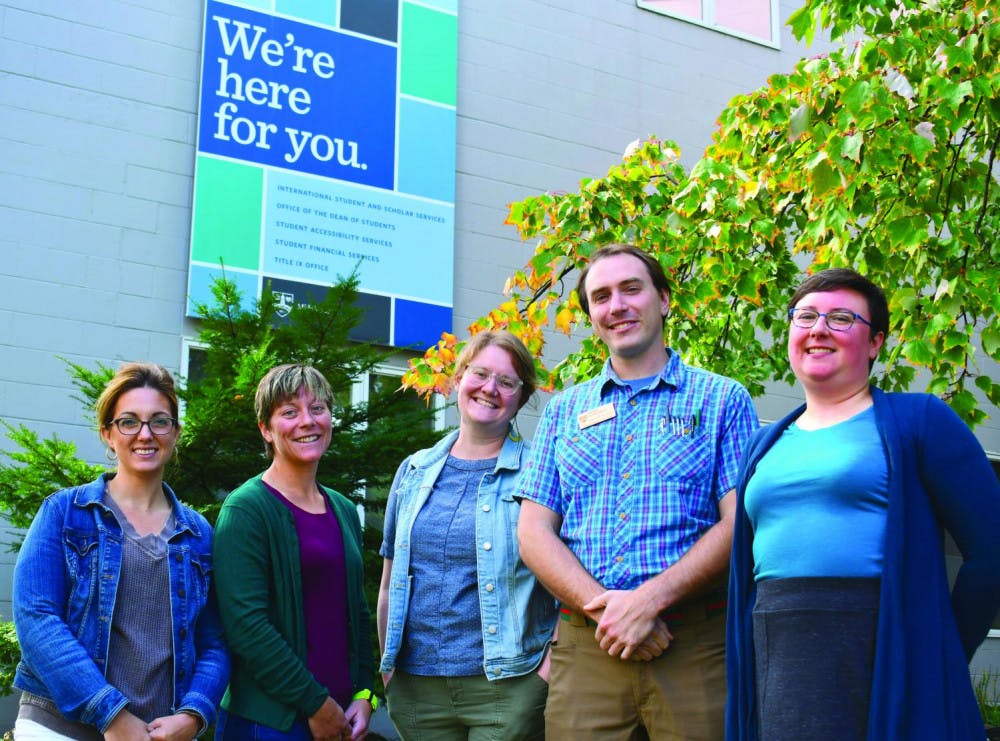The Office of Health and Wellness Education has recently expanded its staff from one full-time employee to four full-time employees and one part-time employee. This expansion will help the office further develop existing programs, as well as focus on new initiatives.
Previously, the office focused primarily on Green Dot trainings, running the MiddSafe program and offering education for students with alcohol and drug infractions.
Barbara McCall, the director of Health and Wellness Education, said this restructuring occurred as part of Workforce Planning.
“I had been laying the groundwork through conversations and program tracking to increase the number of staff in the office for a number of years,” she said. “Every time I had to turn down an opportunity to facilitate a training or participate in an event, I logged it.”
The new positions in the office include a violence prevention and advocacy specialist, an alcohol and other drug education specialist, the assistant director for the office.
“The job descriptions for all of the health educators in the office were built around the existing programs and the unmet needs that students, faculty, and staff had expressed over the last five-six years,” McCall said.
With the additional employee-power, the office’s will take on new initiatives intended to promote health, prevent illness and reduce personal, campus and institution-wide health risks.
Before this expansion, McCall was solely responsible for running the office, and has been since she took on the practitioner-director position in 2013.
McCall’s role will now focus on institution-wide initiatives, such as the JED Foundation collaboration, a non-profit which partners with colleges to improve mental health, substance abuse and suicide prevention initiatives. She is also planning on expanding Health and Wellness Education to the Middlebury Institute of International Studies, various summer programs and in the Schools Abroad.
McCall said she is excited to promote health topics that Middlebury has not previously focused on, such as the importance of sleep and flu prevention.
“A challenge that I think we are overcoming is a cultural and workforce shift to prioritize proactive, preventative work,” McCall said. “It is very easy to only focus on responding to problems as they arise, even though we know that providing early support, skill-building opportunities, and health information can help members of our community reach out earlier and more effectively for help.”
In the past, the majority of the office’s resources have been dedicated to Green Dot, a prevention-focused bystander education initiative, and MiddSafe, a student-operated crisis hotline.
“We have developed some flagship programs, like Green Dot and MiddSafe, but know that there’s plenty of room for additional programming to truly approach violence prevention holistically,” McCall said.
Emily Wagner, the college’s first violence prevention and advocacy specialist, will start hosting events for students in October, which is Dating/Domestic Violence Awareness Month.
Kareckas is focused on expanding the scope of wellness education. In his new role, Kareckas will work with students to create proactive initiatives to normalize substance-free activities. This differs from the office’s former approach, which focused primarily on education for those who had already received an infraction for substance abuse.
New staff members were also brought on to focus on mental health, including Madeline Hope, the office’s assistant director
“We have heard loud and clear that students need mental health support beyond counseling services,” McCall said “Madeline Hope’s new portfolio within her role as the assistant director is to engage programs and supports to do just this.”
Hope’s role will include shifting the scope of the suicide prevention program to include training for faculty in assisting students in distress. According to McCall, the goal for this new position include increasing stress-management programming, which will now occur throughout the whole year, as opposed to just during finals weeks.
Hope will also be involved in the Peer Support Training Skills program, a “J-term workshop aimed at building student empathic listening skills to support friends who might be struggling with mental health challenges.”
The final employee included in this expansion is Erin Goodrich, a full-time Middlebury employee who spends half her time with Health and Wellness and the other half with Student Activities. Goodrich will be supporting the office administratively by creating a new online education software program, as well as helping with general planning and support.
Overall, McCall hopes her office’s expanded potential will help increase healthy living habits on campus and give students the resources they need.
“Health is the capacity of individuals and communities to reach their potential,” McCall said. “Health promotion and prevention is essential to students’ community engagement, participation in immersive learning, and development of skills as global problem solvers in support of Middlebury’s mission.”

Lucy Townend '22 is a Managing Editor alongside Abigail Chang.
She previously served as a senior section editor, a local editor, and a copy editor.
Townend is majoring in International Politics and Economics, studying French throughout her years at Middlebury and is planning on completing a thesis focused on income inequality and regime change.
This previous summer, Townend interned as a private banking analyst at a mid-sized bank in Chicago and plans to continue her work there after graduation.




